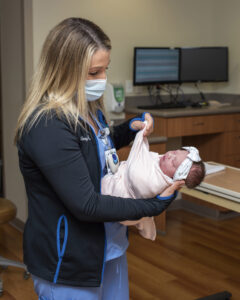
When a baby is born at Hillsdale Hospital, a soft lullaby starts to ring through the halls, announcing the arrival of a new life to patients, staff and visitors. Hearing that happy melody is enough to make some stop what they’re doing and consider the joy of the family as they hold their child for the first time and bask in that infant glow.
These moments never get old for the team of nurses and physicians who guide the mothers and babies through the birthing process because they are invested in each patient and delighted in each baby. While the mother experiences childbirth and treasures her baby’s first hours outside the womb, the team is constantly at work in the background, making sure both mom and baby are healthy.
“You have to truly love what you are doing to be an obstetrics nurse,” said Hillary Zimmerman, clinical nurse manager of Hillsdale Hospital’s Bediako Birthing Center, “The field is not one where your heart allows you to leave work at work, because your patients stay with you forever.”
Zimmerman leads a highly-skilled team of nurses in collaboration with the birthing center’s physicians and midwife. In rural communities, it’s becoming increasingly rare to find a birthing center, much less one that’s thriving, but at Hillsdale Hospital, each member of the team is passionate about the work they’re doing, and as a result, hundreds of babies are safely delivered each year.
The physicians and nurses at Hillsdale Hospital are intentional about staying up to date on evidence-based practices. Health-related drills prepare them for high-risk situations like hemorrhages and eclampsia, and their advanced equipment and technology provides valuable tools for whatever a patient may need. With a neonatal resuscitation simulator, the team is equipped to provide full-spectrum care for newborns after delivery. The team also utilizes the latest technology like the Jada device, which helps control abnormal bleeding that could lead to emergent hysterectomies.
“Our birthing center has so much to be proud of. We may be seen as small, but we are mighty,” Zimmerman said. “We educate ourselves thoroughly and in multiple areas of obstetrics and neonatal care. We learn the complexities of triage, labor and delivery, antepartum, and postpartum care as well as social work and lactation support so we can best serve our patients.”
One of the ways the team goes above and beyond in their care, is by doing everything they can to preserve their patients’ emotional and mental health. Every member of the team knows how important it is for a labor and delivery room to have a relaxed and safe atmosphere, especially when a mom is struggling to remain calm during the birthing process. After a delivery, that environment is key to the time mom and baby spend together, healing from what is often an overwhelming experience. This requires absolute assurance of safety for the newborn. That’s why the clinical team is highly trained in keeping every baby safe from the moment they’re born to the moment they walk out the birthing center doors and into the world with their parents.
“The safety of your newborn should be the least of your worries during the first moments of life with your baby,” Zimmerman said, “Knowing you are delivering in a place where safety is of utmost importance hopefully places mom’s mind at ease so she can focus on bonding and caring for her infant.”
Infant abductions are a horror that Hillsdale Hospital has never had to face, but that is a standard the staff refuses to compromise, and they are fully equipped to protect each child.
“My vision of safety is that we never experience an infant abduction because we have properly prepared ourselves for these situations and have implemented the most up-to-date robust security system,” said Zimmerman.
An imperative part of that preparation is the Hugs Infant Security System. When a baby is born, a nurse puts a soft band around his or her ankle and activates the attached tag. If the band is loosened or detected near an exit, all the exit doors automatically lock and the system alerts go off. The system tells the team exactly where the infant is located and ensures no exit is possible until the assailant is found. Along with this sensitive alert system, the team is also trained in annual Code Pink drills to prepare for any scenario in which a child might be abducted. “The beauty of a code drill is you never know when it is going to happen so it keeps you constantly on your toes and holds you accountable for refreshing your knowledge on what to do,” Zimmerman explained, “We don’t take them lightly, and a perfect example of this was a staff member physically jumping over the counter to stop the ‘assailant’ from ‘stealing a baby.’ I always use this as an example of our staff’s dedication to the safety of our newborns.”
In many rural communities throughout America, birthing services have been closed down or dropped to the bottom of the priority list. But in Hillsdale Hospital, the health and safety of our mothers and babies is highly valued.
“Most of our staff call Hillsdale home, so the nurses are passionate about assuring mothers and newborns have positive outcomes,” Zimmerman said, “Helping patients have the experience they desire and deserve while improving patient outcomes and assisting in the decline of maternal and infant mortality for our community is why I and my colleagues do what we do every day.
